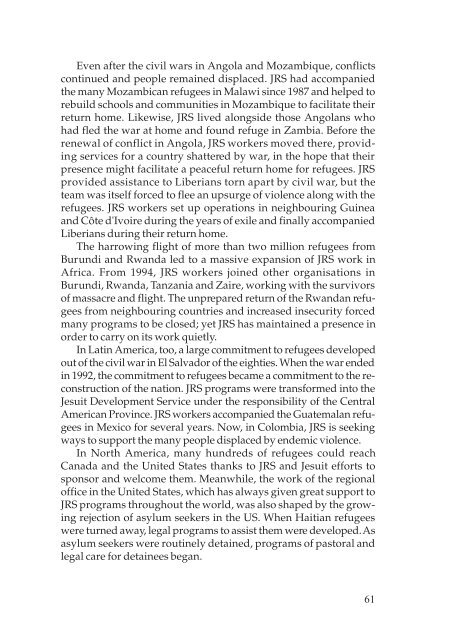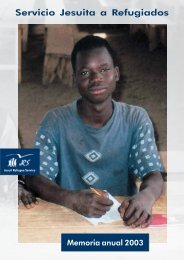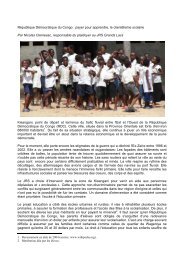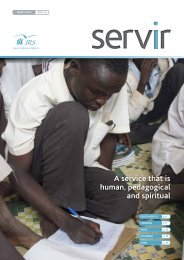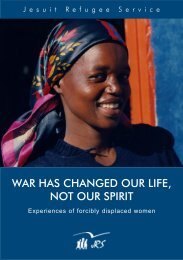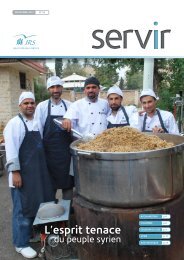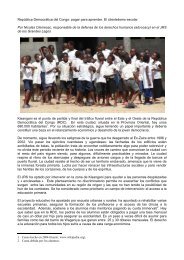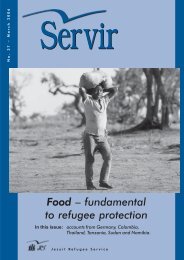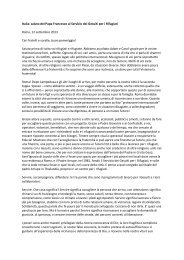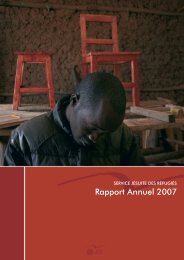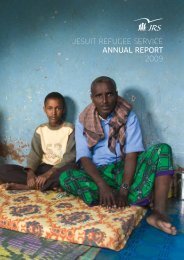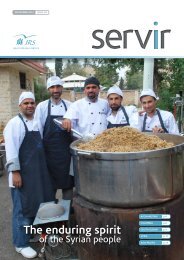EVERYBODY'S CHALLENGE - Jesuit Refugee Service | USA
EVERYBODY'S CHALLENGE - Jesuit Refugee Service | USA
EVERYBODY'S CHALLENGE - Jesuit Refugee Service | USA
Create successful ePaper yourself
Turn your PDF publications into a flip-book with our unique Google optimized e-Paper software.
Even after the civil wars in Angola and Mozambique, conflicts<br />
continued and people remained displaced. JRS had accompanied<br />
the many Mozambican refugees in Malawi since 1987 and helped to<br />
rebuild schools and communities in Mozambique to facilitate their<br />
return home. Likewise, JRS lived alongside those Angolans who<br />
had fled the war at home and found refuge in Zambia. Before the<br />
renewal of conflict in Angola, JRS workers moved there, providing<br />
services for a country shattered by war, in the hope that their<br />
presence might facilitate a peaceful return home for refugees. JRS<br />
provided assistance to Liberians torn apart by civil war, but the<br />
team was itself forced to flee an upsurge of violence along with the<br />
refugees. JRS workers set up operations in neighbouring Guinea<br />
and Côte d'Ivoire during the years of exile and finally accompanied<br />
Liberians during their return home.<br />
The harrowing flight of more than two million refugees from<br />
Burundi and Rwanda led to a massive expansion of JRS work in<br />
Africa. From 1994, JRS workers joined other organisations in<br />
Burundi, Rwanda, Tanzania and Zaire, working with the survivors<br />
of massacre and flight. The unprepared return of the Rwandan refugees<br />
from neighbouring countries and increased insecurity forced<br />
many programs to be closed; yet JRS has maintained a presence in<br />
order to carry on its work quietly.<br />
In Latin America, too, a large commitment to refugees developed<br />
out of the civil war in El Salvador of the eighties. When the war ended<br />
in 1992, the commitment to refugees became a commitment to the reconstruction<br />
of the nation. JRS programs were transformed into the<br />
<strong>Jesuit</strong> Development <strong>Service</strong> under the responsibility of the Central<br />
American Province. JRS workers accompanied the Guatemalan refugees<br />
in Mexico for several years. Now, in Colombia, JRS is seeking<br />
ways to support the many people displaced by endemic violence.<br />
In North America, many hundreds of refugees could reach<br />
Canada and the United States thanks to JRS and <strong>Jesuit</strong> efforts to<br />
sponsor and welcome them. Meanwhile, the work of the regional<br />
office in the United States, which has always given great support to<br />
JRS programs throughout the world, was also shaped by the growing<br />
rejection of asylum seekers in the US. When Haitian refugees<br />
were turned away, legal programs to assist them were developed. As<br />
asylum seekers were routinely detained, programs of pastoral and<br />
legal care for detainees began.<br />
61


